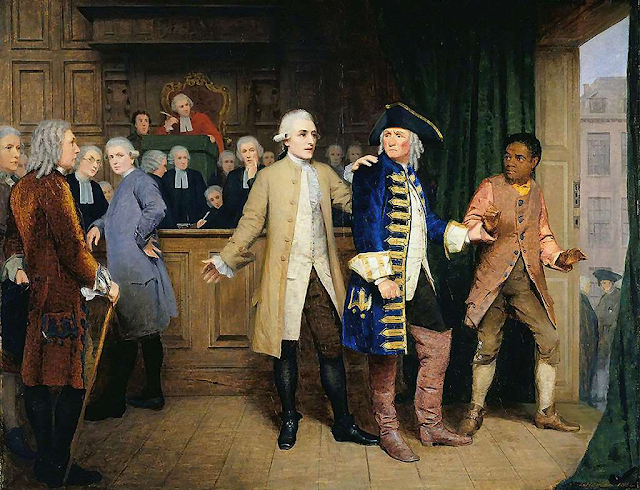I’m leading a project exploring the ubiquity of Aristotle outside the Academy. He has often been mobilised in progressive causes, but nothing can be done to rehabilitate the muddled thinking of the first few chapters of his Politics; despite acknowledging that some of his contemporaries regarded slavery as contrary to nature, he justifies it, especially in the case of Greeks enslaving non-Greeks whom they have conquered. These chapters were incessantly cited by apologists for slavery in Europe and North America, as has been superbly analysed by Professor Sara Monoson.
 |
| With Profs. Patrice Rankine, Sara Monoson, Henry Stead |
And in 1772, Aristotle’s argumentation
was at the centre of an era-defining case that came before the King’s Bench
in London.
James Somerset, born
in West Africa, was purchased in Virginia by the merchant Charles Stewart.
Stewart moved to London in 1764. He sold or leased his other slaves, but took
James, then aged about 23, with him. The young man met London’s thousands-strong
free Black community and white Abolitionists and was adopted by two; they became
his godparents when he was baptised in Holborn in 1771; shortly afterwards, he
left Stewart’s service and refused to return.
Stewart, incandescent,
had Somerset kidnapped and imprisoned on board a slave ship to be taken to
Jamaica and sold. But Somerset’s godparents made an application for a writ of Habeas
Corpus before the King’s Bench; he was released pending the trial. The
defendant, the person illegally detaining Somerset, was the ship’s captain,
James Knowles.
Somerset’s legal team was financed by inveterate antislavery campaigner Granville Sharpe, one of the earliest and most assiduous Abolitionists. There was great tension in the court when the first of them, John Alleyne, rose to speak at the hearing on May 14th 1772. He introduced Aristotle into his argument almost immediately, in part using Montesquieu’s The Spirit of Law (1748), sensing the importance of refuting the chief authority underpinning the slavers’ apologias:
’Tis
well known to your Lordships, that much has been asserted by the ancient
philosophers and civilians, in defence of the principles of slavery: Aristotle
has particularly enlarged on that subject. An observation still it is, of one
of the most able, most ingenious, most convincing writers of modern times, whom
I need not hesitate, on this occasion, to prefer to Aristotle, the great
Montesquieu, that Aristotle, on this subject, reasoned very unlike the
philosopher. He draws his precedents from barbarous ages and nations, and then
deduces maxims from them, for the contemplation and practice of civilized times
and countries.
Alleyne now subjected
Aristotle’s prose to his lawyerly scalpel. First, if a man has spared a man in
battle, whatever rule of war ensured that he did so must also make him return
his liberty. Secondly, the question of a contract (Locke’s proposal) in this
context is absurd, since in all contracts both sides must have full power to
agree to it. If a man agrees to dispose of all rights vested in him and his
descendants, he effectively stops being a moral agent and has no rights to
invalidate those of his descendants. Most importantly, slavery is not natural:
it is ‘a municipal relation; an institution therefore confined to certain
places, aid necessarily dropt by passage, into a country where such municipal
regulations do not subsist’.
A month later, on 22
June 1772, the ruling was made in Somerset’s favour by William Murray, Lord
Mansfield of Kenwood and Chief Justice of the Court of King’s Bench (Murray
happened to live with a great-niece, Dido Belle, the daughter of an enslaved
African woman and Mansfield’s nephew).
The public inferred that slavery was now illegal in England. This historic and public refutation of Aristotle made slave-owners across the world shudder.
England
became an attractive destination for people who had escaped slavery anywhere else.
And the following Saturday evening, according to the Public Advertiser, ‘near
200 Blacks…had an Entertainment at a Public-house in Westminster, to
celebrate the Triumph which their Brother Somerset had obtained over Mr. Stuart
his Master. Lord Mansfield’s Health was echoed round the Room; and the evening
was concluded with a Ball’. I would like to have been in that pub.
 |
| ‘Granville Sharp the Abolitionist Rescuing a Slave from the Hands of His Master’ by James Hayllar, 1864, |
Professor Monoson and I are discussing this, and other moments when Aristotle was central to constitutional and Abolitionist debates, at the University of Chicago, on the invitation of Professor Patrice Rankine, on Thursday 4 April: here’s an AI image I generated to publicise it. Aristotle is here getting refuted by Frederick Douglass, who himself visited Britain several times while campaigning for Abolition. I’m sorry Aristotle’s hair came out a bit bouffant, which makes him resemble Karl Marx. Teaching this old lady new AI tricks is proving a little difficult.



